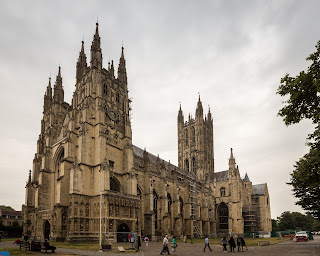Famed Fragments from the past
Our concerted efforts have brought us to Worcester, where the present Cathedral Church of Christ and our Lady dates from the 13th century, but there has been a religious foundation here since the 7th century. A Norman Cathedral was built in the 11th century but only the crypt remains. It was the burial place of King John (of Magna Carta fame), who had stipulated in his will that he wanted to be buried in the cathedral between St. Wulfstan and St. Oswald. This will, incidentally, is the oldest surviving will of a British monarch and is kept in the cathedral to this day.
In the later Middle Ages the cathedral priory was noted for its already-established tradition of Roman chant, and a notable collection of over 100 anonymous pieces of church music from the 13th and 14th centuries has become known as the 'Worcester polyphony' since all indications point to its being assembled by monks at the cathedral. Following a dissolution of the monasteries in the 1530s the cathedral-priory was re-founded as a Cathedral Church under a Dean and Canons.
Among its early organists were the composer Nathaniel Giles (whose introit/anthem, 'Almighty Lord and God of love', we still sing occasionally) and Thomas Tallis. Its longest serving organist was Sir Ivor Atkins, who held the position from 1897 to 1950, and whose editions of the Bach Passions were the standard English versions for many years, but of course the musician most associated with the town is Edward Elgar, whose father had a music shop in the town for many years. He is commemorated in the cathedral by a memorial window.
As a regular guest conductor of the 'Three Choirs Festival', Elgar often appeared at performances in the cathedral. Among other notable figures buried in the building are the statesman, Sir Stanley Baldwin, who started his public life as a local MP before becoming Prime Minister three times.
Having arrived at Worcester we have now visited all three of the cathedral towns which form the 'Three Choirs Festival'; an annual music festival held at the end of July, which rotates among the three cathedrals within the county - Gloucester, Hereford and Worcester. Founded originally in 1715, as the Annual Music Meeting of the Three Choirs, it is now one of the world's oldest classical choral music festivals. While the festival originally solely featured the three choirs performing, the large-scale choral repertoire is now performed by the Festival Chorus and attracts other major ensembles and international soloists. Many well known works received their premieres at the Festival (including Haydn's 'The Creation', Vaughan Williams', 'Fantasia on a Theme by Thomas Tallis' and 'Five Mystical Songs') and several composers enjoyed a long association with the famed festival. Among them, Edward Elgar, Ralph Vaughan Williams, Hubert Parry, Zoltán Kodály, William Walton and Arthur Sullivan.
Video Credit: You Tube, Philharmonia Orchestra (London, UK) - Three Choirs Festival






Comments
Post a Comment